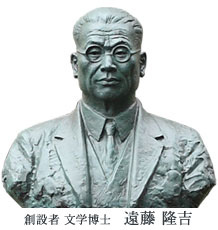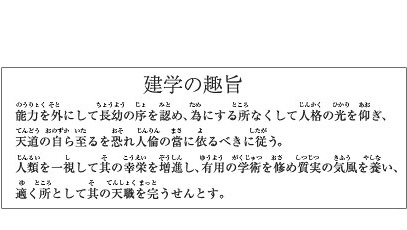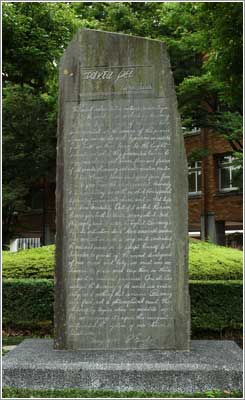Founding spirit and philosophy: Cultivating useful academic knowledge and business ethics
Dr. Endo Ryukichi, the doctor of literature who founded Sugamo Higher Commercial School, described the "purpose of founding the school" as follows when he set about establishing his own educational institution:


[ Commentary ]
No matter how superior one may be in terms of education, social status, or wealth, one must always be polite to older people and have the humility to yield one step to them. One must also honestly respect the dignity of the personality of all people, and honestly acknowledge and admire the good points of those with excellent personality, never misinterpreting or slandering them for one's own personal convenience.
We must always keep in mind that the way of heaven is always on the side of good deeds and that evil deeds will surely be punished, and we must be cautious in our actions and, under any circumstances, be careful not to stray from the path that we should follow as human beings.
In addition, we must treat all human beings as equals, without discrimination, strive to promote the happiness of others as well as our own, and work hard at learning, fully recognizing that it benefits both ourselves and society. At the same time, we must always place solidity above all else, not be influenced by worldly trends, refrain from luxury, and possess an ambitious spirit to overcome difficulties, so that we can faithfully carry out our assigned duties and contribute to our own improvement and the development of society.
In July 1938, Endo Ryukichi decided to establish the Seisei-shiu Shuyo Dojo in Tsudanuma, Chiba Prefecture, and erected a "Seisei-shi" monument within the dojo to clarify its purpose. On the front of the monument, the Greek heading "All things flow" (panta rhei) by philosopher Heraclitus is followed by the English inscription "Seisei-shugi" (theory of life), which indicates the founder's academic position. The Pantarai theory, which holds that fire is the principle (origin) of all things, is a philosophical principle that Heraclitus discovered after he lost a battle and lost his position as a member of the royal family of Ephesus, and resembles the state of enlightenment he reached after coming to terms with the harsh reality of the rise and fall of things. Endo Ryukichi, the founder, sought wisdom in "useful science" to help people survive in the midst of the violent changes of such a violent reality. And from the beginning, the school has respected the educational philosophy of respecting practical learning.
Ryuichi Endo also stated:
Today, the decline of business morality is extremely chilling. The slump in foreign trade is ultimately the result of this. Therefore, it must be said that it is of the utmost urgency to instill business morality in those who wish to become businessmen, and in particular to instill in them the warrior spirit.
Endo Takayoshi lamented that the forgetting of the samurai spirit at the time had led to the decline of business ethics, and pointed out that this was also the cause of the slump in foreign trade, and that it was urgent to teach business ethics and instill the samurai spirit in those who would stand out in the world as businessmen. Commerce is an exchange between people, and to interact with unknown people across borders and ethnicities, one must have the ethics of trusting others and keeping promises. To achieve this, it is important to cultivate a perspective that considers the state of the world based on Eastern ethics and the samurai spirit. The significance of establishing Sugamo Higher Commercial School lay precisely in overcoming the decline in business ethics at the time.
Educational philosophy: Cultivating chidoka
Ryukichi Endo's educational philosophy is to cultivate people who can fulfill their real calling with lofty ideals and who can view individual sciences from a comprehensive perspective, in other words, "chidoka." Our university's mission is to inherit this philosophy and cultivate the new generation of chidoka" through "practical learning," a field of study that is useful in the real world.
In today's interpretation, chidoka can be defined as "a leader with a strong sense of ethics who can take a broad perspective, grasp the changes of the times, and solve various social problems."
The model of a true educator is chidoka.
Endo Takayoshi stated his position as a Jido-ya by saying, "An educational scholar is not necessarily an educator, a scholar is not necessarily a seer, and a politician is not necessarily well versed in chidoka. Only a Jido-ya can penetrate the ills of chidoka and observe a part from above the whole." He said that a true educator is neither an educational scholar nor a politician, but chidoka ya is the model. He then stated his basic philosophy of education as follows:
The essence of education is to know the greatness of people,
The purpose is to let people know why they are great.
This is also the first priority when dealing with people.
[ Commentary ]
It is essential for those who educate people to have a deep understanding that human beings are endowed with absolutely great talents. Educators must love their students wholeheartedly and respect them as human beings. On that basis, they must teach their students so that they can understand why people are great and how they can demonstrate their own greatness as human beings. This is not only the basic attitude between teacher and student at university, but also the most fundamental for how all people in society at large interact with each other. It must be deeply borne in mind that without this, there would be no true identity of a university, and there would be no hope for the welfare and prosperity of human society, let alone its structure.

Sugamo Commercial High School Founding Philosophy
In his prospectus for founding Sugamo Higher Commercial School, Takayoshi Endo wrote about the school's founding philosophy as follows:
"Today, people tend to neglect business education. This is truly unfortunate. Businessmen should occupy the top positions in society, and business is by no means an endeavor that aims solely at personal profit, but rather is an honorable enterprise that aims to serve society. There is still much room for the thorough implementation of business education."
Endo Takayoshi was concerned about the social trend of the time that neglected vocational education. Business should benefit not only oneself but society, and is a respectable business that aims to serve society. Therefore, he founded Sugamo Higher Commercial School with the aim of providing useful academic education that can respond immediately to real social trends such as diversification and internationalization, in other words, education that respects practical learning.
The concept of vocation: vocational education for the right person in the right place
Chiba University of Chiba University of Commerce aims to provide a vocational education that places the right person in the right position. Vocational education aims to develop individuals who can make individual decisions from a comprehensive perspective that sees things objectively, through the three educations of "academics, simplicity, and ethics." In line with this idea, Chiba University of Commerce has adopted an educational policy that values "practical learning," and each faculty has established a system in which students can learn specialized knowledge that can be used in society while putting it into practice.